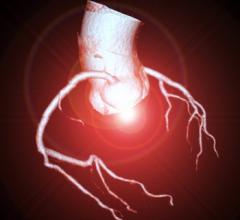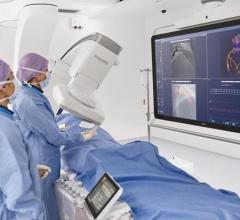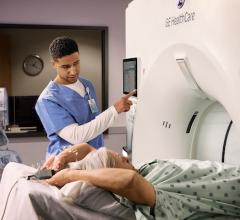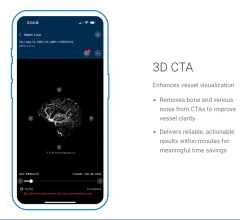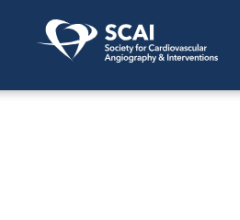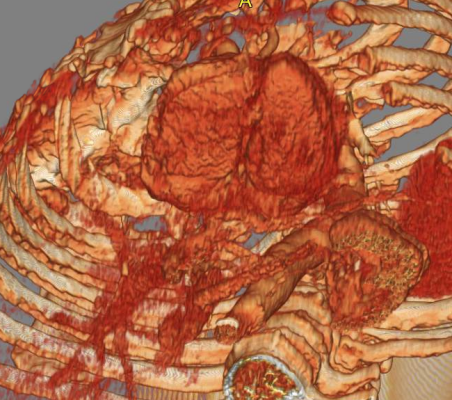
March 28, 2012 - Two large clinical trials were presented in the late-breaking clinical trials session at the American College of Cardiology's (ACC) 61st Annual Scientific Session this week that indicate coronary computed tomography angiography (CCTA) used as a tool to evaluate patients with chest pain in the emergency department is safe, time-efficient and cost-effective, compared to the current standard approach.
The ACRIN-PA trial was presented by Harold Litt, M.D. M.D., Ph.D., chief, cardiovascular imaging section, Department of Radiology, Hospital of the University of Pennsylvania. It was also published online this week in the New England Journal of Medicine. The multicenter, randomized controlled study of the American College of Radiology Imaging Network (ACRIN) aimed to compare CCTA versus standard care of low-risk patients in emergency departments who present with potential acute coronary syndrome. In the study, 1,392 low-risk patients presenting potential ACS were randomly assigned to either a standard triage group or to a CCTA group.
Patients treated with CCTA had a shorter hospital stay and were also discharged in a shorter amount of time and in greater numbers than those diagnosed with the current standard care evaluation. The CCTA group had 50 percent of patients discharged directly from the emergency department when compared to 23 percent of the standard evaluation, and the total length of stay was 18 hours, as opposed to 25 hours. CCTA also proved better at identifying coronary artery disease, with 9 percent to the standard stress test's 3 percent. Cost effectiveness will be a future focus for researchers, including data for in-hospital and 30 day cost.
ROMICAT II (Rule Out Myocardial Ischemia/Infarction Using Computer Assisted Tomography) is a multicenter randomized comparative effectiveness trial of cardiac CTA versus standard triage evaluation in acute chest pain patients in the emergency department. This study, presented by Udo Hoffmann, M.D., Massachusetts General Hospital, examines whether integrating cardiac CT improves the efficiency of the management of these low-intermediate risk patients. The trial involved 1,000 patients, who entered the emergency department with chest pain and after initial evaluation, were randomly assigned to either a CT scan or to standard triage evaluation.
Results indicated that the patients diagnosed with a CT scan reduced their average time spent in the hospital by 18 hours. Fifty percent of patients receiving the CT scan were safely discharged within nine hours, while only 15 percent of patients receiving standard care as a diagnosis were discharged in that time period. The reduced time produced an emergency department cost savings of 10-20 percent, compared to the standard care diagnosis. Healthy patients also experienced personal healthcare savings, being responsible solely for the CT scan and blood test, and their scan provided a prognostic resource for any further future incidents.
"Given the results of CT STAT, the ACRIN-PA study published in the New England Journal of Medicine and presented at late-breaking clinical trials yesterday, and then ROMICAT II, presented today at late-breaking clinical trials, we now have four randomized trials that demonstrate that the CTA strategy is faster than standard of care, cost-efficient and safe," said Matthew Budoff, M.D., immediate past president of the Society of Cardiac CT (SCCT). "These trials, in summary, should warrant a level of highest evidence. Prior to these latest trials, the ESC [European Society of Cardiology] already gave CTA a class IIA recommendation for use in acute chest pain, and this evidence should allow advancement to level I evidence. The CTA strategy, when sufficient expertise is available, is safe, time-efficient and cost-efficient for patients and hospitals,"
"Both trials support the use of coronary CTA in low- to intermediate-risk patients presenting to the ED with negative cardiac enzymes and negative or non-diagnostic ECG. They support prior available evidence confirming the safety of a negative CTA to discharge patients, leading to decrease length of stay and potential cost-savings. Cautious implementation of this modality in the ER setting is needed to ensure proper patient selection and preparation, available expertise, and coverage," said Ricardo C. Cury, M.D., chairman of radiology, Baptist Hospital of Miami and Baptist Cardiac and Vascular Institute.
For more information: www.SCCT.org
Related ACRIN-PA Study Content:
VIDEO: CT for Chest Pain Evaluation in The Emergency Department — Interview with Harold Litt, M.D.
VIDEO: ACRIN-PA Trial Showed Benefit of CT in Assessing Chest Pain — Litt explaining the trial.


 January 09, 2026
January 09, 2026 

